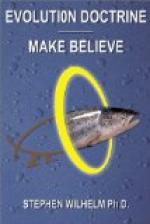* * * * *
What now are the results of variation, over-multiplication, and competition? Since some must die because nature cannot support all that she produces, since only a small proportion of those that enter upon life can find a foothold or successfully meet the hordes of their enemies, which will be the ones to survive? Surely those that have even the slightest advantage over their fellows will live when their companions perish. It is impossible that the result could be otherwise; it must follow inevitably from what has been described before. The whole process has its positive and its negative aspects: the survival of the fittest and the elimination of the unfit. Perhaps it would be more correct to say the more real element is the negative one, for those which are least capable of meeting their living foes and the decimating conditions of inorganic nature are the first to die, while the others will be able to prolong the struggle for a longer or shorter period before they too succumb. Thus the destruction of the unfit leaves the field to the better adapted, that is, to those that vary in such a way as to be completely or at least partially adapted to carry on an efficient life. In this way Darwinism explains the universal condition of organic adjustment, showing that it exists because there is no place in nature for the incompetent.
* * * * *
Finally we come to the process of inheritance as viewed by Darwin, and its part in the production and perfection of new species. In every case, Darwin said, the efficiency or inefficiency of an animal depends upon its characteristics of an inherited or congenital nature. Variations in these qualities provide the array of more or less different individuals from which impersonal nature selects the better by throwing out first the inferior ones. An organism can certainly change in direct response to environmental influence or by the indirect results of use and disuse, but not unless it is so constituted by heredity as to be able to change adaptively. Therefore the final basis of success in life must be sought in the inherited constitutions of organic forms.
For the reason that the qualities which preserve an animal’s existence are already congenital, they are already transmissible, as Darwin contended. Since his time much has been learned about the course of inheritance and its physical basis, and the new discoveries have confirmed the essential truth of Darwin’s statement that the congenital characters only possess a real power in the evolution of species.




